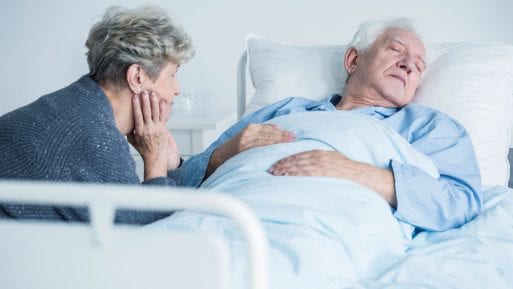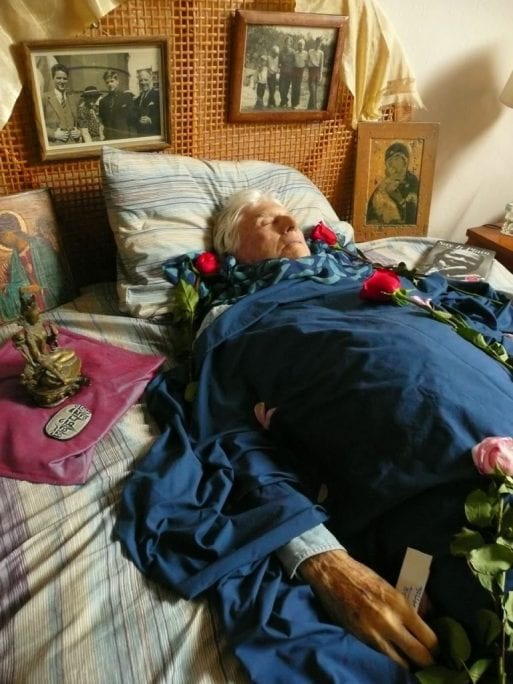
Even those who choose to die at home from unrelated causes are being impacted by COVID-19.
Credit: mcknightseniorliving.com
As the global pandemic of COVID-19 wears on into its third month, deaths from the virus continue to climb. On April 1, 2020, the novel coronavirus killed over 1,000 Americans in a single day, and those numbers are expected to rise over the next few weeks. The number of people testing positive for the virus has also skyrocketed, reaching over 186,000 as of April 1.
As a result of the sheer number of people who are ill with the virus, many hospitals have reached or will reach capacity soon. Thus, many people who would, under other circumstances, be hospitalized for their symptoms will need to be cared for at home. Some of these people will recover. But inevitably, some of them will die.
The pandemic also has serious implications for people with life-limiting illnesses who choose to spend their last days at home. Many hospital morgues and funeral homes that normally store the dead until they are cremated or buried are full and don’t have the resources to transport bodies elsewhere. Additionally, many municipalities are or will be changing procedures due to staffing shortages or office closures, making filing a death certificate (without which final disposition can’t take place) more difficult. What’s more, if a person dies at home and the cause of death is at all equivocal, the coroner or medical examiner may need to be brought in to ensure that the person did not die of COVID-19.
The combined result of all of these realities is that many Americans who are unprepared to do so will be caring for their deceased loved ones at home.
The National Home Funeral Alliance Steps In
In order to help Americans who find themselves in the position of caring for a loved one’s body in the home, the nonprofit National Home Funeral Alliance and a team of death care professionals have created a free webinar, “Home Funeral Guides and Pandemic Care.” The target audience of the webinar was initially death care professionals such as home funeral guides. But the advice shared will prove invaluable to anyone who is caring for a person who dies in the home during this incredibly difficult time.
The webinar begins by emphasizing the importance of maintaining infection control measures for anyone who had or appeared to have COVID-19. This means that the number of people caring for the body should be minimized, and those people who are in attendance should continue to wear protective clothing and masks as they did while the person was alive. Additionally, those caring for the body should:
- Maintain social distancing (stand at least 3 to 6 feet apart)
- Put a mask over the person’s nose and mouth
- Place an ice pack high on the person’s neck
- Avoid moving the body unnecessarily
The webinar goes on to explain that under the current circumstances, families may have to keep their loved one’s bodies at home for some time, so a home funeral may be the best way to honor the person who has died.
Ways to Connect
Under normal circumstances, a home funeral is a wonderful way to celebrate the life of a loved one who has died. Friends and family can gather in the home and enjoy a more intimate and personal service than that provided by a funeral home, and prayers, rituals, and ceremonies can be customized in more meaningful ways. The funeral can be planned well in advance, allowing everyone who chooses to be involved to play a role.

With a few modifications, families of COVID-19 patients can hold a meaningful home funeral and stream it to friends and loved ones.
Credit: naturaltransitions.org
With that said, even in the case of an unexpected death, a home funeral can provide a great deal of comfort to the loved ones of the person who died. Obviously, under the present circumstances, only those people who lived in the home and cared for the loved one can be there in person. But there are many ways to share the experience with others no matter how far away they are. Livestreaming funerals is actually a fairly common practice today, and with a little technological savvy, it’s easy to do from home. Services such as Zoom, Facebook Live and YouTube Live are free and easy to use and allow all attendees to participate virtually.
In fact, says Lee Webster, former president of the NHFA, spending time at home with a loved one who has died can be an empowering experience. “The act of caring for our own at home is really about empowering families to understand that they may not have control over this pandemic or the death of their loved ones, but they do have control over how they will use that time after the death to do what needs to be done physically and emotionally and spiritually,” Webster said.
What’s more, freed from the time constraints of a “traditional” funeral, mourners have a unique opportunity to be present with their own grief, something our culture typically overlooks, Webster said. “By changing the way we view that time of waiting for final disposition for our loved ones who die at home,” he said, “we stand to find ways to turn that time into engaging in our grief in a positive way.”
To learn more about how to care for your loved one’s body after death, visit the National Home Funeral Alliance online. In addition to many helpful tutorials and videos, the organization is currently offering resources specific to the coronavirus in the section Pandemic Resources for Families Facing End of Life.

 At-Home Death in the Midst of the Coronavirus Pandemic
At-Home Death in the Midst of the Coronavirus Pandemic


 “Songbird” by Fleetwood Mac
“Songbird” by Fleetwood Mac

 How to Comfort A Dying Loved One
How to Comfort A Dying Loved One














